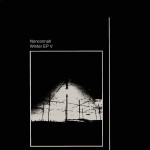 Zuletzt war dem aus Zach und Denny Corsa bestehenden Duo Nonconnah auf diesen Seiten noch bzgl. ihres großartigen Vollzeitalbums „Songs For And About Ghosts“ attestiert worden, sie „präsentieren auf ihrem dritten regulären Album vier lange, aus verschiedenen Teilen bestehende Tracks, die so klingen, als hätten ein paar schemenhafte Gestalten ein altes, nicht mehr ganz funktionstüchtiges Grammophon in einem Schneesturm aufgestellt.“ Weiterlesen
Zuletzt war dem aus Zach und Denny Corsa bestehenden Duo Nonconnah auf diesen Seiten noch bzgl. ihres großartigen Vollzeitalbums „Songs For And About Ghosts“ attestiert worden, sie „präsentieren auf ihrem dritten regulären Album vier lange, aus verschiedenen Teilen bestehende Tracks, die so klingen, als hätten ein paar schemenhafte Gestalten ein altes, nicht mehr ganz funktionstüchtiges Grammophon in einem Schneesturm aufgestellt.“ Weiterlesen
Schlagwort-Archive: Silber Media
There’s always been hints of apocalypse in our work: Ein Interview mit Nonconnah
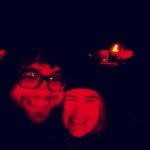 Das nach einem Ort in Tennessee benannte aus Zachary Corsa und Denny Wilkerson Corsa bestehende Duo Nonconnah spielt “Damaged hymns from the broken Mid-South”. Vorher hatten die beiden zahlreiche Tonträger unter dem Namen Lost Trail veröffentlicht, einem selbst so bezeichneten “ambient/drone/shoegaze project”. Musikalisch knüpft Nonconnah an das Vorgängerprojekt an: Feldaufnahmen, Samples, Giatarre und Drones werden zu einer Musik verdichtet, auf der das Dunkle und Mysteriöse, das sich im Klangbild, Artwork und in Tracktiteln widerspiegelt, (auch immer) ein Moment des Trostes enthält. Weiterlesen
Das nach einem Ort in Tennessee benannte aus Zachary Corsa und Denny Wilkerson Corsa bestehende Duo Nonconnah spielt “Damaged hymns from the broken Mid-South”. Vorher hatten die beiden zahlreiche Tonträger unter dem Namen Lost Trail veröffentlicht, einem selbst so bezeichneten “ambient/drone/shoegaze project”. Musikalisch knüpft Nonconnah an das Vorgängerprojekt an: Feldaufnahmen, Samples, Giatarre und Drones werden zu einer Musik verdichtet, auf der das Dunkle und Mysteriöse, das sich im Klangbild, Artwork und in Tracktiteln widerspiegelt, (auch immer) ein Moment des Trostes enthält. Weiterlesen
There’s always been hints of apocalypse in our work: An interview with Nonconnah
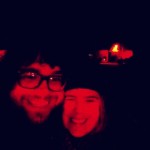 The duo Nonconnah, that consists of Zachary Corsa und Denny Wilkerson Corsa and that is named after a place in Tennessee, plays “Damaged hymns from the broken Mid-South”. Before that the two of them released quite a number of records as the “ambient/drone/shoegaze project” Lost Trail. Musically there is a continuiation: Field recordings, samples, guitars and drones are condensed into music in which the dark and mysterious elements which are reflected in the sound, artwork and track titles (also) contain a moment of consolation.
The duo Nonconnah, that consists of Zachary Corsa und Denny Wilkerson Corsa and that is named after a place in Tennessee, plays “Damaged hymns from the broken Mid-South”. Before that the two of them released quite a number of records as the “ambient/drone/shoegaze project” Lost Trail. Musically there is a continuiation: Field recordings, samples, guitars and drones are condensed into music in which the dark and mysterious elements which are reflected in the sound, artwork and track titles (also) contain a moment of consolation.
Correct me if I’m wrong but I got the impression that you changed your name from Lost Trail to Nonconnah when you moved from North Carolina to Tennessee. Was this the main reason? What are for you the similarities and the differences between Nonconnah and Lost Trail?
It’s less that we’ve changed our name and more that Lost Trail came to a natural conclusion. Relocating to Memphis felt like a convenient time to phase out the Lost Trail name and start afresh with a different approach, but we were reaching a point of wrapping up the project regardless. While it’s still primarily both of us making experimental music, there’s some crucial differences. One is that instead of endlessly churning out releases on small labels, we’re spending more time carefully crafting the works, covering minute details to make everything sound as dynamic as possible. There’s a lot more layers and a lot less emphasis on ‘lo-fi’ than there was in the past. Whereas lo-fi was our modus operandi in the Lost Trail days, now it’s more of an embellishment to existing pieces. Another key difference between Lost Trail and Nonconnah is the presence of a great many more collaborators. We’ve opened up this insular world to become more of a collective, and this has accordingly brought elements of a lot of other genres into the work besides just ambient and drone.
When one looks at the titles of your recordings, and also the names under which you record, one gets the impression that “nature” (however vague a term that is) seem to be important role for you. To what extent does it influence your songs and songwriting process?
Nature is incredibly important to what we do and how we live our lives. Zach was raised by a professional wildlife watercolorist and spent much of his childhood outside in natural places, from the mountains of western Massachusetts to the barrier islands of eastern North Carolina. We’re both very focused on environmental/nature-related and animal-related issues in our personal lives; we camp and hike whenever we have the opportunity. One of the over-arching themes of both Lost Trail and Nonconnah’s work is those liminal spaces where nature and the man-made meet and create a sort of otherworldly mingled landscape. We both spend a great deal of time photographing abandoned places and ruins, places that are being reclaimed by nature. We initially bonded over this interest and it continues to fascinate us and find its way into our art.
Both Lost Trail and Nonconnah have released “winter” EPs. What role do seasons play in general and winter in particular for you and your music?
The ‘winter’ EPs are part of a series SIlber Records does every year, and its always 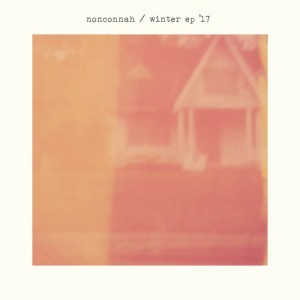 enjoyable and challenging to find a way to tie mood-based instrumental music in with specific seasonal atmospheres. Theme-based challenges keep your creative impulses sharp as sound artists. We tend to think of our music as autumnal, bittersweet and tinged with gold and lingering somewhere between the extremes of the neighboring seasons. There’s a pleasurable sort of melancholy to autumn that speaks to us. Zach is also deeply, deeply obsessed with Halloween, which should be no surprise to fans as the supernatural is part of our work and of many song titles.
enjoyable and challenging to find a way to tie mood-based instrumental music in with specific seasonal atmospheres. Theme-based challenges keep your creative impulses sharp as sound artists. We tend to think of our music as autumnal, bittersweet and tinged with gold and lingering somewhere between the extremes of the neighboring seasons. There’s a pleasurable sort of melancholy to autumn that speaks to us. Zach is also deeply, deeply obsessed with Halloween, which should be no surprise to fans as the supernatural is part of our work and of many song titles.
You once stated that you make deliberate use of lo fi recording equipment. How important is such an approach for you? Do you see it as liberating from the (seemingly) endless possibilities of current technology?
It’s easy to become overwhelmed with the abundance of choices available to home recording artists today. We like to limit ourselves to the simplest, most primitive options available. Becoming overwhelmed with too many choices ultimately leads to no choices at all. Fundamentally, we reject the idea that any technology becomes ‘obsolete’ once a ‘newer’ technology comes along. That’s inherently wasteful. Cassette especially has an imperfect warmth to it that conjures up trace nostalgia for people of our age, as does VHS warble and tracking static, blurred Polaroids, etc. I suppose part of it could be taken as a deliberate rejection of commodity/consumerist culture and the drive for materialism that dominates 2018 in America. It’s a splendid form of protest to use ‘dead’ technology in spite of the jeers of all the modernized folks plugging in to Spotify. On the other hand, we couldn’t do what we do without advances in laptop recording technology, so it’s definitely a balance of need vs. principle.
Is there a special order in which elements of the songs come together? How do you decide what field recordings work? What is the relationship between improvisation and composition in your recording process?
In the Lost Trail days, pieces were created from a foundation of complete improvisation most of the time, in quick bursts of energy and focus. With Nonconnah, we’re working from simple acoustic guitar and piano demos we’ve accrued over the past few years. The demos gather until they’re plentiful enough, we parse down to the best ones, and we then elaborate on them. Usually there’s a base of simple guitar that underlines the general idea of the demo. This is later accentuated with other instruments and sounds, and finally, field recordings are culled from either public domain sources or from what either of us have recorded on our portable recorders or phones and stowed away. It really is a matter of pure instinct which field recording goes where, and that extends to the titles of the pieces as well. Sometimes it just feels right – as if we’re conduits for some outside force divining through us. It should be noted that, as in the Lost Trail days, we still don’t overdub in the proper sense. We collage. We record pieces independently and tinker with overlaying them until they ‘fit’. Working as if the piece is a collage lends a great element of surprise to the work.
On your website you call your music “damaged hymns from the broken midsouth”. How ambivalent is your relationship to the region in which you live?
No ambivalence here, actually. We’re quite happy here. Memphis is an incredible and undiscovered sort of place, an out-of-the-way gem thats been stereotyped by its (admittedly very real) problems to the point that gentrification has mostly passed the city by. Memphis is a fiercely proud, tight-knit, gritty place with a lot of local color and a sizable amount of good cheer, and there’s incredible art of all kinds being made here. Memphis is a considerable muse for us – we live a bit outside of town, out in the rural hinterlands, but we spend most of our time in Memphis proper. So when we say ‘damaged hymns’ from a ‘broken’ place, it’s said entirely with real affection. There’s beauty in the damage of Memphis, in the struggle to rise with spirits high from the endless blocks of abandoned factories and liquor stores and the unabashed neon tourist fantasias downtown, the stretches of spectral bayou. Memphis is a very special place., a beautiful city that takes care of its own. We’re trying to honor that with our work.
I was wondering if that which has been called southern gothic plays any role for the music you make.
Sure, to some extent. Truman Capote, Eudora Welty, Flannery O’Connor, William Faulkner…these are tangible, very present ghosts in this part of the world. Really it’s the South itself though that provides the backdrop to our sounds. We always said in the Lost Trail days – and it holds true for Nonconnah as well – that we’re through-and-through a Southern band. We wouldn’t be making the sort of music we do if we lived in Buffalo. For better or worse, the South is who we are. It’s a complicated and mysterious history here. There’s nowhere more haunted by its past in America than the South. So much of daily life in the South is infused with a sense of coming to terms with the past. We saw it recently in Memphis with the removal of the Nathan Bedford Forrest statue. It isn’t possible to live in the South and not have the past touch you.
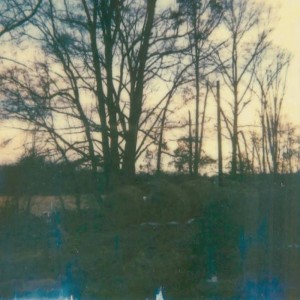 Your music can have dark elements but there is something soothing, too. Is there a balance in your work between “gloom” and “glowing” (to allude to your latest album)?
Your music can have dark elements but there is something soothing, too. Is there a balance in your work between “gloom” and “glowing” (to allude to your latest album)?
Definitely. We would never want to stray entirely too far in the direction of the light or the darkness. Both are elementally strengthened by the presence of the other, and both collapse on their own without that balance in place. It seems dishonest to create music that doesn’t accurately reflect both light and dark experiences, as they’re both terrifying and beguiling in equal measure. Light and darkness make us who we are. When there’s a dark presence on an album, it’s always counter-acted by the presence of some light, and when the light soars too high, the darkness settles it back to earth.
For me a lot of your music has this kind of dreamlike and somnambulistic quality and empty buildings and blurred images have turned up frequently on the covers of your releases. Would you say that these are an adequate representation of your “dronegaze”?
Absolutely. When you look at a lot of the themes of our pieces, be it the nature of the field recordings, the titles, or even just the sounds themselves, there’s a common thread of trance-like and otherworldly experiences, something that takes you outside of yourself. Supernatural visitations, religious mania, political paranoia, drug trips…these are all altered states of mind, all transcendent and revelatory states. That’s what the best music does for us. It colors your perception of the world around you, which is ultimately art’s basic purpose, to reflect back experiences in ways that make you reconsider and grow. The sense of the eerie, the uncanny, drives our work to an extent. Not just those borderlands where sprawl meets woodlands, but the outlands we cross when we give ourselves over to these transformative experiences. If our music had one visual accompaniment to spell everything out, it would be a silent neighborhood at that time of day when night has almost completely fallen but there’s still a thin orange band of light looming over the horizon. That’s where we linger.
You are going to release a new album soon and you mention that a lot of guest musicians have contributed. Is the album a continuation of “The Gloom & The Glowing”?
No. ‘The Gloom & The Glowing’ was made during a very difficult time and stands alone as an artifact of that time. It shows us transitioning out of being Lost Trail but not yet moving forward into whatever was going to happen next. The new album is the realization. We’d say ‘Gloom’ has much more in common with the Lost Trail of old. Perhaps it was a necessary purging of those old ghosts before we could move forward.
Would you say that the South is a good region for experimental music?
It definitely is. The inherent pathos of being Southern has always made for compelling, envelope-pushing art. In our opinion, you can find the best experimental music the South has to offer in the smaller towns and cities, where a lack of existing cultural infrastructure has led to a lot of folks figuring it out on their own and thus reshaping the mold in their own insular communities, free of influence. Sometimes it’s better to not be one of a thousand looping hipsters in Bushwick or Portland. Greenville, North Carolina. The Winchester and Culpeper areas of Virginia. Cleveland, Mississippi. Murray, Kentucky. Murfreesboro, Tennessee. These places all have intriguing little scenes. We suppose one can thank the Internet for much of the proliferation, so thanks, Internet.
Your music is not explicitly political but on your twitter account you voice your opinion about current events (e.g. the Parkland shooting) quite clearly. Do you think the current developments may be reflected more explicitly in your work?
We think it’s inevitable that what’s going on in America in 2018 will work its way into most everyone’s art, either consciously or subconsciously. There’s always been hints of apocalypse in our work, but the new album quite unintentionally formed itself around ‘apocalypse’ as a sort of allegory for memory loss, growing older, and impermanence. It’s there in the way that memory itself is a kind of haunting, in the way our ‘old’ technology ages and decays and is discarded along with our memories and our former lives. To live in a dystopia like modern America is to reckon with that edge-of-the-world sense of slow-motion apocalypse on a daily basis, to find a way to incorporate it into your existence and reckon with it without going insane. As far as directly addressing politics, we’d say that near the end of the new album we’re a bit more politically forthright than we’ve been in the past. Now’s the right time to do it.
MG
CARTA: An Index Of Birds
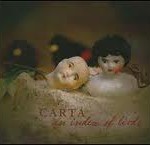 Kyle Monday scheint es nicht sehr eilig zu haben, mit seiner in der Besetzung häufig wechselnden Band CARTA eine umfangreiche Diskografie vorweisen zu können. Schon kurz nach der Jahrtausendwende in der kalifornischen Bay Area gegründet, dauerte es ein halbes Jahrzehnt, bis der erste Longplayer „The Glass Bottom Boat“ das Licht der Öffentlichkeit erblickte. Es war die Zeit, als Begriffe wie Postrock (noch immer) und Shoegaze (erneut) in aller Munde waren, weshalb sie jenseits des großen Wassers auch mit Handkuss von Kritikern und Publikum empfangen wurden. Vielleicht ist die Tatsache, dass im deutschsprachigen Popdiskurs seit Jahren ein Abgrund zwischen Subkultur und progressivem „Indie“-Mainstream konstruiert wird, ein Grund, dass CARTA in unseren Breiten bislang der Empfang mit Pauken und Trompeten verwehrt blieb. Weiterlesen
Kyle Monday scheint es nicht sehr eilig zu haben, mit seiner in der Besetzung häufig wechselnden Band CARTA eine umfangreiche Diskografie vorweisen zu können. Schon kurz nach der Jahrtausendwende in der kalifornischen Bay Area gegründet, dauerte es ein halbes Jahrzehnt, bis der erste Longplayer „The Glass Bottom Boat“ das Licht der Öffentlichkeit erblickte. Es war die Zeit, als Begriffe wie Postrock (noch immer) und Shoegaze (erneut) in aller Munde waren, weshalb sie jenseits des großen Wassers auch mit Handkuss von Kritikern und Publikum empfangen wurden. Vielleicht ist die Tatsache, dass im deutschsprachigen Popdiskurs seit Jahren ein Abgrund zwischen Subkultur und progressivem „Indie“-Mainstream konstruiert wird, ein Grund, dass CARTA in unseren Breiten bislang der Empfang mit Pauken und Trompeten verwehrt blieb. Weiterlesen
